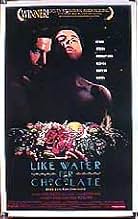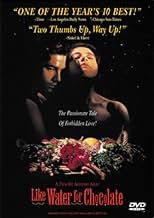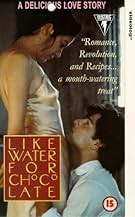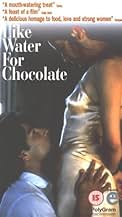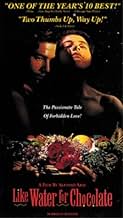AVALIAÇÃO DA IMDb
7,1/10
20 mil
SUA AVALIAÇÃO
Quando a tradição a impede de se casar com o homem que ama, uma jovem descobre que tem um talento único para cozinhar.Quando a tradição a impede de se casar com o homem que ama, uma jovem descobre que tem um talento único para cozinhar.Quando a tradição a impede de se casar com o homem que ama, uma jovem descobre que tem um talento único para cozinhar.
- Indicado para 1 prêmio BAFTA
- 27 vitórias e 14 indicações no total
Avaliações em destaque
10Jim B-2
Scenes of incredible beauty and humor. This film appeals to all of humankind's tastes (visual, intellectual, gustatory, sexual, etc.) It is one of the greatest romantic comedies showing the lives, values and beliefs of another culture ever presented as a gift to the American public. Be aware though that it is not an experience that will appeal to everyone. You won't enjoy it if you don't love food, have an imagination and understand that daytime soaps are not art.
Usually when I read a book, I am disappointed by the movie; there is so much more in the written word than can be put on screen. And when I see a movie I never want to read the book afterwards. This was the first movie that I read the book after seeing the movie; Como Agua Para Chocolate is THAT good a movie! And the book is WONDERFUL! The fairy tale aspect of this movie is told subtly, but with a strong Hispanic sense of mysticism-- you have the evil (step)mother, the heroine as Virgin Mary, who has magical powers, unrequited love, the unobtainable prince, and other classic fairy tale elements. This combines with the real elements of the Mexican Revolution and old world family practices revolving around family relations, martimony, and most of all cooking. Food plays a major role in this movie, but even more so in the book. I recommend both the book and the movie.
Years ago, in California, I walked into a gas station convenience store to buy some consumable or other. The man who took my money was a Mexican emigre, and he saw that I was carrying a copy of the book Like Water for Chocolate by Laura Esquivel. He asked how I liked it, and I told him I was loving it. He told me not to miss the movie.
"Oh," I answered, "but I always worry that the movie will never be as good as the book."
"It doesn't matter," he told me. "This is a very great film. And it is the first real Mexican film I have ever seen shown in this country. You know, to everybody, not just the Mexican community."
I smiled and told him I would check it out, but honestly, I had no idea what he was talking about. After all, I knew who Dolores Del Rio and Cantinflas were, and the movies with them that I had seen were shown in L.A., to everybody.
But now, at last, I have seen this movie, and now, at last, I know what this guy was talking about. Like, wow! This really is a real Mexican film! Art! Cinema! More than just a bit of popular fluff!
Tender, compassionate and very witty, like the book on which it is based, this movie celebrates Mexican culture -- not just on the food, the preparation of which forms the premise of the story, but as kind of a rollicking take on the history of the young country at the turn of the century. It celebrates the music, the style of life on a ranch, the strength of the extended family, the beauty of the land, and the ethnic mixing pot that is every Mexican.
There is so much reckless joy and passionate love in this film, even when it portrays pain. It openly depicts female eroticism. (Plus, for a big change from US cinema, we get to see beautiful men and women of many shapes, sizes and colors all on the same screen.) The acting is flawless, and the star, Lumi Cavazos, is absolutely charming, full of life and credibility.
The only flaws I found in this film were minor and had to do with timing. For example, the final ascent to the climax seems to have been shortchanged a little bit. I would have liked to reach through this scene a little more slowly.
To judge Mexican cinema by the type of films I had seen before this one would be like judging U.S. cinema on the basis of Jerry Lewis or some cheesy melodramas from the '40s and '50s, but not taking into account any of our real film art. I'd love to know what else I've missed. Can't wait to find out.
"Oh," I answered, "but I always worry that the movie will never be as good as the book."
"It doesn't matter," he told me. "This is a very great film. And it is the first real Mexican film I have ever seen shown in this country. You know, to everybody, not just the Mexican community."
I smiled and told him I would check it out, but honestly, I had no idea what he was talking about. After all, I knew who Dolores Del Rio and Cantinflas were, and the movies with them that I had seen were shown in L.A., to everybody.
But now, at last, I have seen this movie, and now, at last, I know what this guy was talking about. Like, wow! This really is a real Mexican film! Art! Cinema! More than just a bit of popular fluff!
Tender, compassionate and very witty, like the book on which it is based, this movie celebrates Mexican culture -- not just on the food, the preparation of which forms the premise of the story, but as kind of a rollicking take on the history of the young country at the turn of the century. It celebrates the music, the style of life on a ranch, the strength of the extended family, the beauty of the land, and the ethnic mixing pot that is every Mexican.
There is so much reckless joy and passionate love in this film, even when it portrays pain. It openly depicts female eroticism. (Plus, for a big change from US cinema, we get to see beautiful men and women of many shapes, sizes and colors all on the same screen.) The acting is flawless, and the star, Lumi Cavazos, is absolutely charming, full of life and credibility.
The only flaws I found in this film were minor and had to do with timing. For example, the final ascent to the climax seems to have been shortchanged a little bit. I would have liked to reach through this scene a little more slowly.
To judge Mexican cinema by the type of films I had seen before this one would be like judging U.S. cinema on the basis of Jerry Lewis or some cheesy melodramas from the '40s and '50s, but not taking into account any of our real film art. I'd love to know what else I've missed. Can't wait to find out.
I'm greatly surprised at some of the negative comments for "Like Water for Chocolate", many of which state how it utterly failed to capture the passion or the mystical tone of Laura Esquivel's book.
I suppose it's only a matter of opinion(like pretty much everything, I guess), but I thought the movie represented the book's magical realism in a great way. The filmmakers knew not to exaggerate or take everything over the top(which could've been very easy), and this gives the fantastical moments-- such as all the guests becoming ill at the wedding or the shower bursting into flame as Gertrudis bathed-- an essential grounding in reality. This fact is also buttressed by the erotic musical score and the whole cast, who fit the characters from the novel perfectly IMO.
I would recommend giving the film of "Like Water for Chocolate" a go; and trying out the book as well.
I suppose it's only a matter of opinion(like pretty much everything, I guess), but I thought the movie represented the book's magical realism in a great way. The filmmakers knew not to exaggerate or take everything over the top(which could've been very easy), and this gives the fantastical moments-- such as all the guests becoming ill at the wedding or the shower bursting into flame as Gertrudis bathed-- an essential grounding in reality. This fact is also buttressed by the erotic musical score and the whole cast, who fit the characters from the novel perfectly IMO.
I would recommend giving the film of "Like Water for Chocolate" a go; and trying out the book as well.
This film had all the ingredients to be a great movie, however, it never materialized on screen. With so many interesting characters, it was disappointing that none of them except Tita connected in a meaningful way and evoked much emotion from from me. Pedro was a prime example of this. Instead of rooting for him, i found myself not only disinterested in his wimpy character but actually disliking him altogether.
Again, i thought this film had a great premise, but failed to deliver on screen. i truly loved the magical realism, and thought the director should have focused more on Titas ability to connect to people through food.
Again, i thought this film had a great premise, but failed to deliver on screen. i truly loved the magical realism, and thought the director should have focused more on Titas ability to connect to people through food.
Você sabia?
- CuriosidadesThe original literal title means very little outside Mexico (it refers to the exact boiling temperature water needs to reach in order to make hot chocolate). Therefore, in France the title has been changed into "Bitter Chocolate", in Poland into "Quails in Rose Petals" and in Japan into "The Legend of the Rose Petal Sauce".
- Erros de gravaçãoWhen Dr. Brown holds up a piece of white phosphorus, nothing happens. White phosphorus ignites in air at room temperature, however, so it should have been shown burning.
- Versões alternativasThe International version is color-corrected, and some voices were re-dubbed in the English spoken language scenes. Includes sex & nudity scenes.
- ConexõesFeatured in The 50th Annual Golden Globe Awards (1993)
- Trilhas sonorasMi Querida Capitan
Written by José Alfonso Palacios
Principais escolhas
Faça login para avaliar e ver a lista de recomendações personalizadas
- How long is Like Water for Chocolate?Fornecido pela Alexa
Detalhes
- Data de lançamento
- País de origem
- Centrais de atendimento oficiais
- Idiomas
- Também conhecido como
- Como agua para chocolate
- Locações de filme
- Empresas de produção
- Consulte mais créditos da empresa na IMDbPro
Bilheteria
- Orçamento
- US$ 2.000.000 (estimativa)
- Faturamento bruto nos EUA e Canadá
- US$ 21.665.468
- Fim de semana de estreia nos EUA e Canadá
- US$ 23.600
- 21 de fev. de 1993
- Faturamento bruto mundial
- US$ 21.744.201
- Tempo de duração
- 1 h 45 min(105 min)
- Cor
- Mixagem de som
- Proporção
- 1.85 : 1
Contribua para esta página
Sugerir uma alteração ou adicionar conteúdo ausente



